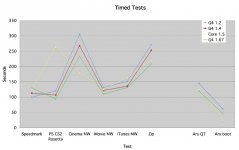To call the Core processors throwbacks is a severe oversimplification, and one that is not entirely correct. The Core architecture is a derivative of the P6 architecture, yes. You are absolutely correct on this point. However to take that point and then presume that the Core processors are on par, clock-for-clock, with the Pentium III-or even close to it-is, in my opinion, a fallacious argument.
Compare, for example, the number of IPS and FLOPS the architectures are capable of (data from SiSoft Sandra XII):
-1.26GHz PIII-S, Tualatin Core: 3429 MIPS, 1612 MFLOPS (or about 2.72 MIPS and 1.28 MFLOPS per MHz)
-1.4GHz Pentium M 715 (closest thing to a Core Solo in SiSoft Sandra): 4544 MIPS, 3392 MFLOPS (or about 3.25 MIPS and 2.42 MFLOPS per MHz)
Based on those numbers (numbers that are probably somewhat conservative because the Core Solo should be faster than the Pentium M that it is VERY closely related to-much more closely than it is to a Pentium III), the Core Solo is capable of executing at least 1.2x more MIPS per MHz and 1.89x more MFLOPS per MHz than the Tualatin Core Pentium III is.
Yes, you can argue that IPS and FLOPS are not the be-all, end-all benchmarks of CPU performance, and I would not dispute that at all. However, combine those with the Core Solo's larger cache and (effectively) faster bus speed... You have a CPU that is quite a bit faster than its ancient, long-dead predecessor. In short, the Core Solo is not "going to be the same, clock-for clock, as a Pentium III." It's just not. It is a heavily revised, updated version of the same architecture, and it is
much faster than its older brother, even without accounting for newer SSE optimizations and things of that nature.
Of course, that's not really what the discussion is about. The discussion is whether the Intel mini is significantly faster than the G4 mini. And, unless I made a MASSIVE mathematical error (which is possible, but I think doubtful, particularly considering that I had the calculations checked multiple times by multiple people), it is. In fact, one need look no farther than the data that
you presented to prove this quite adequately. Problem is, the reviews you linked to don't present the data in a format that is conducive to the creation of a real appreciation for the size of the performance disparities between the two machines.
All the reviews do is throw numbers around... this machine is faster than that machine by 150 seconds, or this one scores 200 points more than that one in benchmark x or whatever. Throwing numbers around like that doesn't necessarily illustrate how large the performance delta between the two machines really is. A better way to analyze it (in my opinion) would be using percentages.
And, with that in mind, I've put together a little chart and a graph of all the benchmark data in the reviews you linked to so you can see just what I'm talking about:


As you can see, there are a few areas (graphics, emulated applications) where the G4 is faster than the Intel.
Significantly faster, in the case of Photoshop.
But in most areas, the Intel machine comes out with a respectable lead, and if you average out all of the results, without weighing any one benchmark more heavily than any other, the Intel machine works out to being very nearly to 40% faster on average, than the G4.
Now, I don't know about you, but I consider a 38% increase in performance to be pretty significant. Unless you're stuck using CS2 or other non-Intel-optimized apps, the Intel machine will, in almost all cases, flat out smoke the G4.



